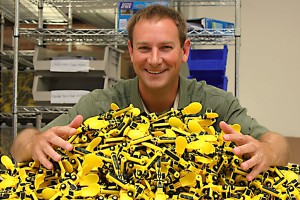
Making meals – and entrepreneurship – child’s play: Constructive Eating
Based in Ann Arbor, Michigan, Constructive Eating makes children’s tableware so engaging that even fussy eaters will eat their vegetables without whining. The company debuted with construction-themed products, such as a “forklift” fork and “front loader” spoon, followed by a line of “garden fairy” plates and utensils.
 Yet Constructive Eating’s innovation is not restricted to its product line. The company is pioneering some nontraditional workplace practices, beginning with a staff comprised almost entirely of high school and college students.
Yet Constructive Eating’s innovation is not restricted to its product line. The company is pioneering some nontraditional workplace practices, beginning with a staff comprised almost entirely of high school and college students.
This youthful workforce began more by happenstance than design. When founders Carter and Jackie Malcolm launched Constructive Eating in 2005, they operated on their own, working from their basement. By 2007 they needed help fulfilling orders and hired their neighbor’s daughter, a high school junior at the time. As the company grew, she referred other students.
The part-time staff works between 4 and 28 hours a week. “Work schedules are flexible, and hours fluctuate to accommodate their classes and extracurricular activities,” explains Carter Malcolm.
Most of the work revolves around inspecting molded plastic parts (actual production is outsourced to Midwest manufacturers), assembling final product and packing orders. “We’re not doing heavy machining work, which is another reason the jobs work well for students,” explains Malcolm. “The most dangerous thing they’re handling is a packaging knife.”
Currently Constructive Eating has two full-time employees (Malcolm and a graphic artist) and employs about 25 students as part-timers — a headcount that constantly varies. Each year the company loses workers who graduate from high school and go away to college. Yet many graduates who attend nearby institutions have been able to remain on board. In fact, Constructive Eating has two employees who have been part-timers for five years, and Malcolm has already extended full-time job offers to them after they finish college.
Due to its young staff, Constructive Eating has developed a unique training system that mimics academic advancement. Employees receive a key chain holding a series of tags that outline different assignments. Once an employee successfully completes a task, a senior-level colleague initials the tag, and the junior employee moves onto a new assignment. After employees work through the entire key chain, they take a written test. If they pass, they move up to the next level. As employees advance, they receive higher wages, take on more responsibility and are expected to provide greater leadership.
Indeed, senior workers are expected to look out for the newer employees. “We believe this encourages considerable growth on their parts,” Malcolm says. “Peer leadership is far more challenging than being in charge of much younger or less experienced people.”
Advancing employees must also read a book from a list that Malcolm has compiled. The books focus on leadership and business fundamentals, and two of the most popular are Sean Covey’s “The 7 Habits of Highly Effective Teens” and “Bo’s Lasting Lessons” by Bo Schembechler and John U. Bacon. “We buy them their own copy and ask them to discuss what they’ve learned,” Malcolm says. “The goal is to help our employees grow either here or outside the company.”
In the past year Constructive Eating has achieved a number of milestones, such as surpassing the $1 million-mark in annual revenue and moving into a new 4,000-square-foot facility. By 2019 Malcolm envisions the company will hit $4 million in annual revenue with growth fueled by new product introductions, including a customizable plate.
As the company grows, Malcolm will add a few full-timers to help with graphic design and sales; however, the part-time student workforce will remain a hallmark of the company. “I like to think we’re helping mold future entrepreneurs,” he says.